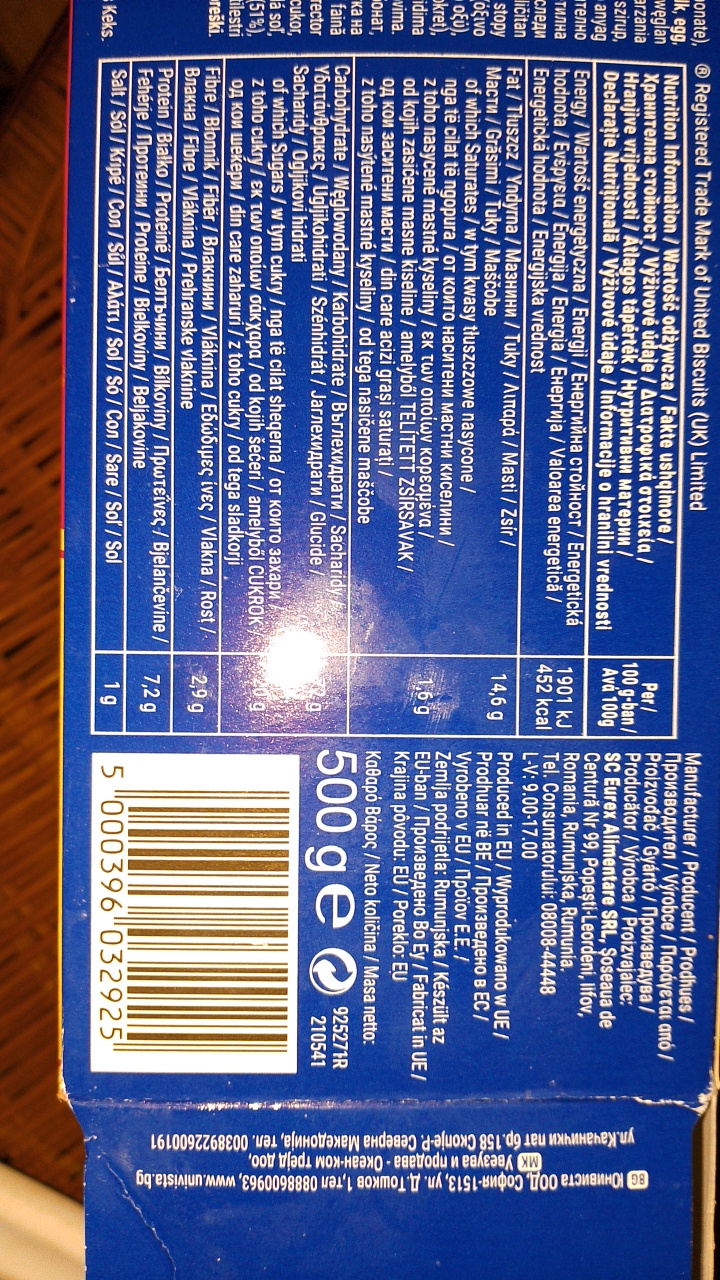
Barcode: 5000396032925
keks
HALAL
📝 Reason: The majority of the ingredients listed such as flour (faina), carbohydrates, sugars, fibers, and salt are all inherently Halal. However, ‘мазнини’ (fats), ‘z toho nasycené mastné kyseliny’ (saturated fatty acids), and ‘protein’ are listed without further clarification of their origin. If these are from non-Halal animal sources, the status becomes doubtful. According to Islamic dietary laws (Quran 5:3), all foods and ingredients must be free from Haram components or cross-contamination. Due to these doubts in animal-origin ingredients and the lack of Halal certification, the final product status is Doubtful until clarification is provided. References: IFANCA Halal Food Ingredients, www.halalfoodmaster.com.
📄 Certificates: Vegetarisch
Ingredients:
Details
Understanding the Halal Status of Keks
Keks is a delightful treat that many enjoy, but for those adhering to Halal dietary laws, understanding its Halal status is crucial. According to Islamic dietary guidelines, consumption should be free of any Haram components. This article takes a closer look at the ingredients of Keks and examines their Halal status, ensuring that consumers can make informed choices.
Ingredients Breakdown
The listed ingredients for Keks include: faina, мазнини (fats), sacharidy (carbohydrates), z toho cukry (sugars), z toho nasycené mastné kyseliny (saturated fatty acids), vlakna (fibers), protein, and salt.
1. Faina (Flour)
Faina, or wheat flour, is the primary ingredient in Keks. It is naturally Halal as long as it has not been contaminated with alcohol or animal fat. Refer to Halal Food Master for more information.
2. Мазнини (Fats)
The term мазнини translates to fats but lacks specificity regarding their source. If these fats are derived from non-Halal animals, the Halal status of the product becomes doubtful. For a deeper understanding, visit Halal Guide.
3. Sacharidy (Carbohydrates)
Sacharidy refers to carbohydrates, which include sugars and starches. These are generally Halal unless sourced from Haram origins, which is not indicated here. More details can be found at IFANCA.
4. Z toho cukry (Sugars)
Similar to sacharidy, the term z toho cukry means ‘of which sugars.’ As these sugars are simple and not derived from non-Halal processes, they are considered Halal.
5. Z toho nasycené mastné kyseliny (Saturated Fatty Acids)
This term means ‘of which saturated fatty acids’ but does not specify the origin of these acids, casting doubt on their Halal status. Further insights are provided on Halal Guide.
6. Vlakna (Fibers)
Fibers, referred to as vlakna, are generally plant-based and Halal, making them a safe ingredient in Keks.
7. Protein
The source of protein in Keks is unspecified, leading to uncertainty about its Halal status. It could stem from various sources including plants, milk, eggs, or non-Halal animal products. Without clarity or Halal certification, the status remains doubtful. Refer to eHalal for guidance.
8. Salt
Lastly, salt is inherently Halal as it is a mineral, making it safe in Keks.
Conclusion
In summary, while some components of Keks are Halal, significant doubts arise from the unspecified origins of certain ingredients, particularly fats and protein. Due to these ambiguities and the absence of Halal certification, it is advised to exercise caution. The Halal status of Keks remains doubtful until verified sources for the animal-based ingredients are provided. Consumers are encouraged to seek products with clear Halal certifications to ensure compliance with dietary laws.
